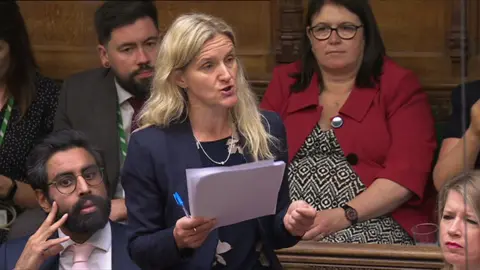MPs debate how much say Senedd should have on assisted dying
 BBC
BBCProposed changes to a law on assisted dying would deprive the Senedd of the power to decide when to bring the bill into force, the House of Commons has heard.
MPs have spent a second day debating amendments to Kim Leadbeater's private members bill.
A power for the Senedd to decide when most of the bill comes into law was added at an earlier stage, but Leadbeater is now trying to have that removed.
Her supporters say this will better reflect the fact that criminal law is not the Senedd's responsibility, but Liberal Democrat Sarah Olney said the bill gives the UK Parliament the power to impose the law on the Senedd.
A Labour politician said that some parliamentarians were "confused" about what is and is not devolved.
Olney said the Welsh Parliament had already rejected the idea last year.
During the same debate MPs voted to prevent health professionals such as doctors from initiating conversations with under-18s about assisted dying.
Members of the Senedd (MSs) voted against the principle of an assisted dying law last October - with 19 in support and 26 against the motion that was tabled by Labour MS Julie Morgan.
Among those opposed at the time were the First Minister Eluned Morgan and the Health Minister Jeremy Miles - senior figures in the government that would be tasked with implementing the bill in Wales.
The Senedd is likely to have to vote again on the bill at least once, and despite the last result, what might happen is unclear.
Nine people abstained in October - enough to allow the motion to pass if they changed their mind.
The motion itself also did not ask Senedd members if they supported Leadbeater's private members bill, which is narrower in scope than what Labour MS Julie Morgan had tabled the Senedd.
However, Miles told S4C's Y Byd yn ei Le in April that his view had not changed on the "principle of it".
"I think the question in terms of the pressure on people at the end of their life is very complex, and there are important responsibilities related to that," he said.
Mr Miles said "we have the principle of the Sewell convention, which requires that every devolved parliament has a voice on this, and the voice of the Senedd here in Wales has been clear on this so far".
The Cardiff parliament will need to debate whether it gives legislative consent over the bill - a move that would not be legally binding but would say whether or not the Senedd is in support.
MPs on Friday debated how much legal power MSs should have.
If the changes pass, the Welsh government will still be able to table regulations in the Senedd, but only on devolved matters.
The UK government will also have powers to make its own regulations.
At the bill's committee stage, Olney amended the bill to add powers for the Senedd to vote on regulations that would bring the bill into force - effectively giving MSs a say on when it becomes law.
The proposal was opposed by UK Labour ministers Stephen Kinnock and Sarah Sackman, as well as Leadbeater herself.
Aberavon MP Kinnock said the clause could potentially "create a disparity, particularly in relation to the introduction of the criminal offences, and a lack of certainty".
In the Commons on Friday Leadbeater said she had recognised "from the outset that the legislation must respect devolution".
The Labour MP for Spen Valley said her changes "ensure that the devolution settlement is respected and adhered to".
'Loophole'
Two Welsh Labour MPs spoke in favour of removing the Senedd's ability to decide when to bring the bill into force.
Alex Barros-Curtis, MP for Cardiff West, said they "fully respect the devolution settlement by ensuring that Welsh ministers have all necessary powers on devolved aspects of the bill - health - while retaining the powers of UK ministers over aspects that are not devolved".
Catherine Fookes, Labour MP for Monmouth, argued that some MPs "seem confused about what is and is not devolved".
She said UK ministers would retain powers over aspects that are not devolved "such as criminal justice provisions and, crucially, changes to the Suicide Act 1961".
Richmond Park MP Sarah Olney told the Commons the bill "gives the UK Parliament the power to impose on the Senedd in Wales a measure that it has expressly said it does not want", and said Leadbeater's amendment would "deprive the Senedd of the right to exercise its legitimate powers".
"It is not just that the amendment would restore the constitutional loophole that the committee had closed; it threatens to create real problems and risks for Welsh citizens if the Senedd is forced to implement the Bill before its devolved healthcare system is ready," she said.
Plaid Cymru's Liz Saville Roberts, who is in support of the bill more broadly, also spoke against the removal of the commencement power.
She said there was a "question of respect for decisions already made in the Senedd".
After the debate, she said the bill could create a situation where "assisted dying would be legalised in Wales, but available only outside the NHS, in private settings".
"That outcome would be unacceptable to those of us who believe in the importance of the NHS as a universal public service," she added.
The amendments did not come to a vote on Friday - they are expected to be decided upon on at a later stage.
Meanwhile provisions for Welsh speakers were passed.
Leadbeater said if "a patient in Wales has Welsh as their first or preferred language, all efforts should be made to ensure they can communicate with voluntary assisted dying services in Welsh".
